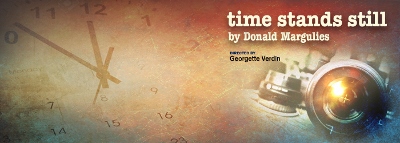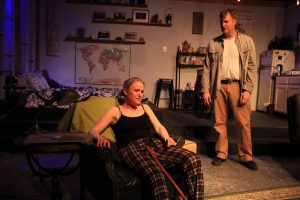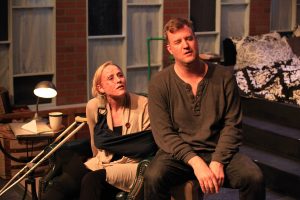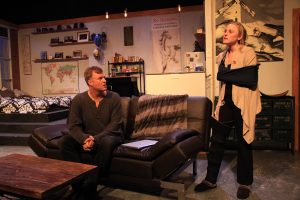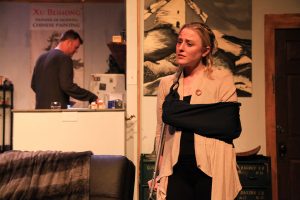FALLING WHILE RUNNING RISKS
Domesticity and danger, it seems, don’t mix. The private and the public, small-scale versus big-issue matters, mingle uneasily in Time Stands Still, now in a persuasive Aston Rep revival staged by Georgette Verdin at Raven Theatre. (The play was first performed in Chicago in 2012 at Steppenwolf Theatre’s upstairs stage in a somewhat passive staging by Austin Pendleton.) Donald Margulies’ heavily freighted 2010 character drama covers too many issues as it focuses on a pivotal choice faced by a thrill-seeking, adrenaline junkie of a photojournalist.
The challenge for Sarah Goodwin, brought home to Brooklyn by an explosion that left her in a coma for two weeks and almost cost her right leg, comes as James Dodd, a war correspondent and her lover of nearly nine years, wants to settle into marriage. “I just want to feel comfortable.” He’d rather deal with death from a distance, perhaps by writing a piece on the “cinema of cruelty” or, if pressed, Syrian and Iraqi refugees. Sure, people can die at any time, as these conflict reporters know well, but some places are a lot safer than Darfur or Kabul (Chicago, for example, despite our bad publicity).
For risk-taking Sarah, who’s repudiated her family’s wealth and complacency, a wedding ring means sacrificing the perils of recording roadside bombs and famine or genocide. She’ll no longer be able to live in the instant where “time stands still” (also an apt description of each picture she takes) and death could be next. “I can’t let it get to me,” she defensively insists, though it clearly has: “I’m such a fraud.” She can’t permit herself the luxury of taking on the very different risk of a middle-class, middle-aged marriage, a commitment you can die with and not from.
Margulies confronts this world-traveling, danger-craving, and newly wedded couple with Sarah’s pragmatic editor Richard Ehrlich, now happily married to his much younger, now pregnant, wife Mandy Bloom. Uneventful herself, Mandy is an event planner who can’t understand how pictures of starving children and piles of corpses can change the world. She will admit that, however briefly, they do make her think, if not care about, strangers on the other side of the planet. Why can’t Sarah preserve the beauty of life, not its many miseries? Why must people be regularly blown up so she can do her job?
Sarah argues that photojournalists just record things, they don’t change them (as in alter them from actuality). Richard quietly agrees, finding it hard to find space for James’ reports on refugees when it’s the annual Hollywood issue that pays the bills. Later, compounding her confusion, Sarah maintains that her photos do change things’”minds, that is–by, improbably enough, creating a catharsis through desensitizing the viewer. Richard finds this contradiction exasperating at best.
Not much is at stake during these 105 minutes, especially when you realize that Sarah will stay set on her mission: Far from sobering her into domesticity, let alone a search for security and solidity, marriage would threaten her way of death. She’ll embrace the chaos of a battlefield over any crises created by children needing dinner. (She’s more temperamentally suited, if threatened by guilt over being childless, taking pictures of kids in a day care center in a woman’s prison.)
Worse for James, Sarah seems altogether too devoted to the memory of dead Tariq, her Iraqi “fixer.” Sarah’s pictures of this one-time lover have created a ghost with whom James refuses to compete. He’s determined to find his emotional outlet too’”perhaps in a 41-year-old Cambodian lady named Vishna. Though their collaboration is finally honored in an annotated photo album, their impasse, well’”it too stands still.
In palpable pain from her latest war wound, a sadly scarred Sara Pavlak McGuire repeatedly finds and detonates all the flash points in Sarah’s minefield of a personality. McGuire finds some spunk in a surly survivor of IEDs and RPGs. But the character still comes off as stubborn and sedentary when she should be aching for action. Especially when she’s still haunted by the blood that’s spattered her lens, her conviction that her pictures make history needs explaining. Robert Tobin plays helpless helpmate James with so much dogged devotion that Sarah’s Hurt Locker act seems even more inexplicable. Though Sarah can’t abide his interest in 70s’ slasher flicks, her obsession with the real stuff is far less innocent.
As the foils whose conditionally happy marriage is the standard that Sarah intends to ignore, Rob Frankel and Kirra Silver are bracingly ordinary. Not so the details of Sarah’s digs, an elaborate assemblage by Jeremiah Barr that suggests all those theaters of war, pushpins on a world map, where Sarah performs like a trooper and to which she’ll soon return. As if we didn’t know’”and far earlier than the author imagines.
photos by Emily Schwartz
Time Stands Still
AstonRep Theatre Company
The Raven Theatre (West Stage), 6157 N. Clark St.
Thurs-Sat at 8; Sun at 3:30
ends on June 11, 2017
for tickets, call 773.828.9129 or visit AstonRep
